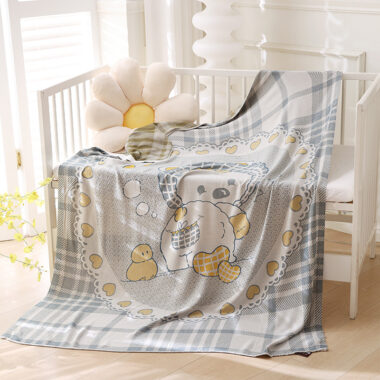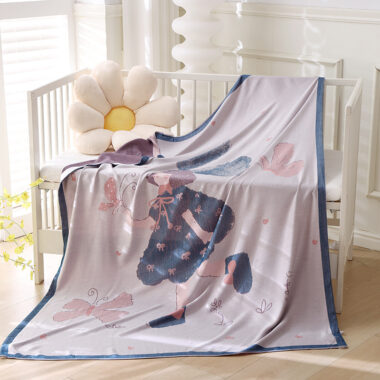Custom blankets are more than just everyday products—they are branded items, promotional tools, and retail bestsellers. For buyers planning to source wholesale blankets, understanding the manufacturing process is essential. It helps ensure that expectations are clear, production runs smoothly, and the final products meet market needs. In this article, we’ll walk through the complete process step by step, showing how a professional blanket manufacturer or factory handles custom orders from concept to delivery.
👉 1. Initial Consultation and Requirements
The first stage begins with communication between the buyer and the supplier. Buyers outline their project goals, whether it is blankets for retail, hotels, promotional gifts, or seasonal sales. Important details include target quantity, budget, material preferences, and design requirements. A professional blanket supplier will ask the right questions to fully understand the project scope. This consultation is crucial because it sets the foundation for the entire process. Without clear requirements, later stages can face unnecessary delays or revisions.
👉 2. Selecting Materials and Fabrics
Material selection is one of the most critical decisions in blanket production. Buyers can choose from fleece, wool, mink, polyester, cotton, or acrylic depending on their market and price range. Each fabric has different qualities—wool for natural warmth, fleece for lightweight comfort, or mink-style for luxury feel. The blanket factory provides swatches and GSM options, allowing buyers to evaluate texture, durability, and suitability. Selecting the right material early ensures that the final blanket aligns with brand positioning and customer expectations.
👉 3. Design Development and Sampling
Once materials are confirmed, the supplier begins developing designs. This includes colors, patterns, weaving techniques, or printing styles. Some buyers request embroidery, edging styles, or branded labels. At this stage, the manufacturer produces sample blankets. Samples serve as a physical reference, letting buyers check size, feel, and appearance. Adjustments are common—whether it’s changing stitching, tweaking dimensions, or refining the logo placement. A professional blanket manufacturer sees sampling as a collaborative process, ensuring that both parties are satisfied before bulk production begins.
👉 4. Confirming Order and Production Planning
After samples are approved, the formal order is placed. This includes finalizing the purchase agreement, payment terms, and production timeline. The blanket factory then prepares the production schedule. Factors such as machine availability, labor allocation, and raw material inventory are considered. Buyers should ask about estimated lead times, which typically range from 25–40 days depending on order size and complexity. Clear planning reduces risks of delays and ensures that the blankets are ready when needed.
👉 5. Bulk Production Process
The bulk manufacturing phase involves multiple steps: weaving or knitting the fabric, dyeing and finishing, cutting to size, stitching, and adding custom features. Throughout the process, the factory’s quality control team checks for consistency in color, softness, and measurements. Defect prevention at this stage is critical—catching issues early avoids problems in the final shipment. Modern blanket factories use advanced weaving machines and computerized printing systems to maintain efficiency and quality at scale.
👉 6. Quality Control and Final Inspection
Before shipment, every order undergoes strict quality control. This includes checking dimensions, GSM, fabric strength, stitching, and overall appearance. Random sampling methods ensure that each batch meets standards. Buyers may also request third-party inspections or certifications like OEKO-TEX to verify safety and compliance. A trustworthy supplier welcomes such checks, as they demonstrate transparency and professionalism. Consistent quality is what builds trust between buyer and factory, making long-term cooperation possible.
👉 7. Packaging and Branding Options
Packaging is often overlooked but plays a vital role in wholesale blankets. Buyers can request retail-ready packaging, branded boxes, or eco-friendly bags. Private labeling is another common option—factories can attach woven labels, printed tags, or barcodes. Proper packaging protects the product during transport and strengthens brand identity when it reaches end consumers. A supplier that offers flexible packaging solutions provides added value beyond the blanket itself.
👉 8. Shipping and Logistics
Once production and packaging are complete, blankets are prepared for shipping. Depending on buyer preference, this may involve sea freight, air freight, or courier delivery. A reliable blanket supplier assists with all export documentation, including packing lists, invoices, and certificates of origin. Experienced factories coordinate with freight forwarders to ensure smooth customs clearance. Buyers benefit from accurate delivery timelines, reducing risks of stock shortages or missed deadlines.
👉 9. After-Sales Service and Support
The relationship with a blanket manufacturer does not end once the goods are shipped. Professional suppliers provide after-sales service, addressing any issues such as damaged goods or delivery delays. They also assist in planning for reorders, offering suggestions for product improvements or new designs based on market feedback. A responsive after-sales team builds trust and helps buyers scale their business without worrying about supply chain interruptions.
🔑 Conclusion
The custom blanket manufacturing process is a structured journey that requires close cooperation between buyer and supplier. From the first consultation to after-sales service, each stage plays a key role in delivering high-quality blankets that meet customer needs. By working with an experienced blanket factory, buyers gain not only products but also a reliable partner for their wholesale business. With clear communication, professional sampling, strict quality control, and timely delivery, custom blanket projects can run smoothly and bring strong returns for international buyers.








